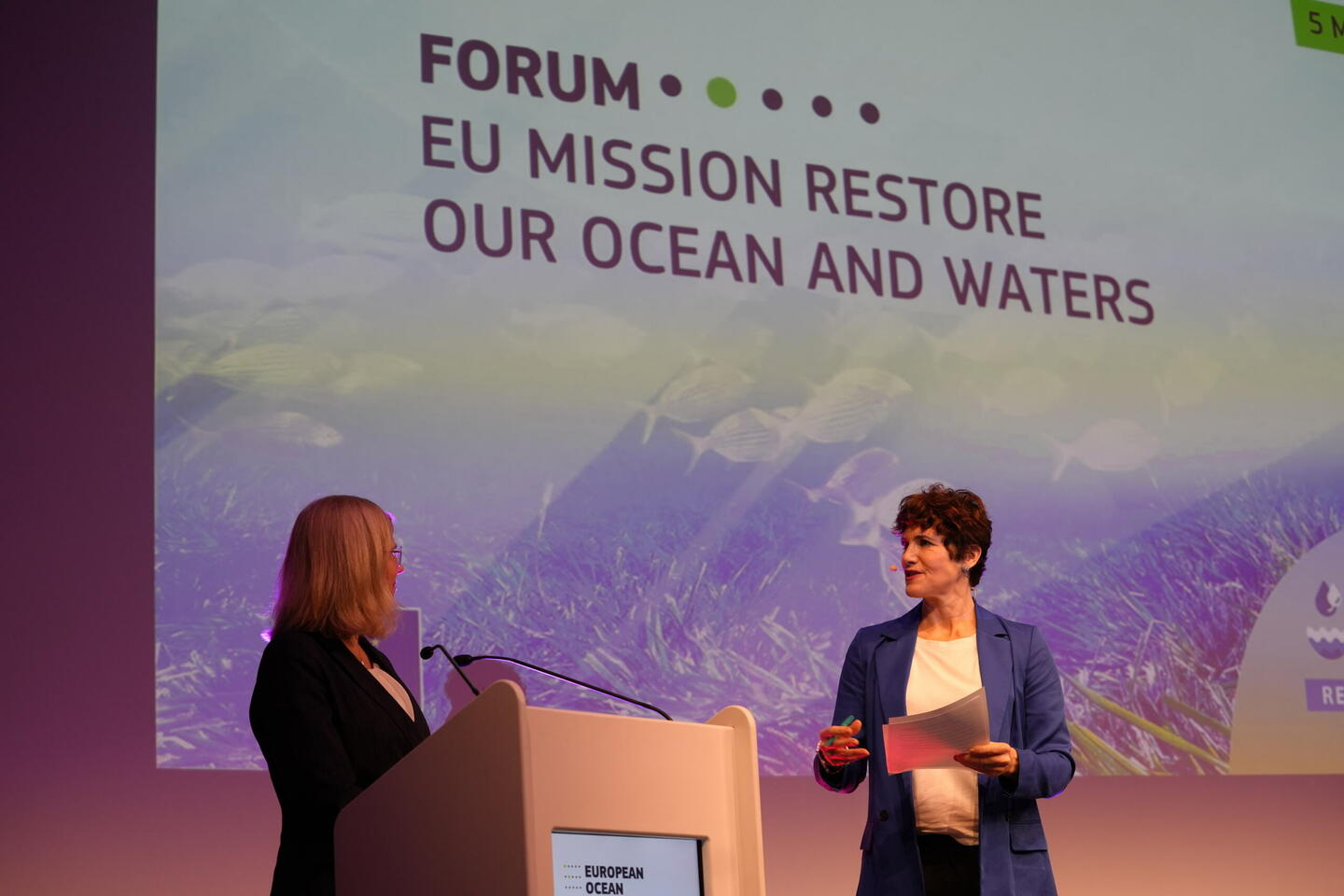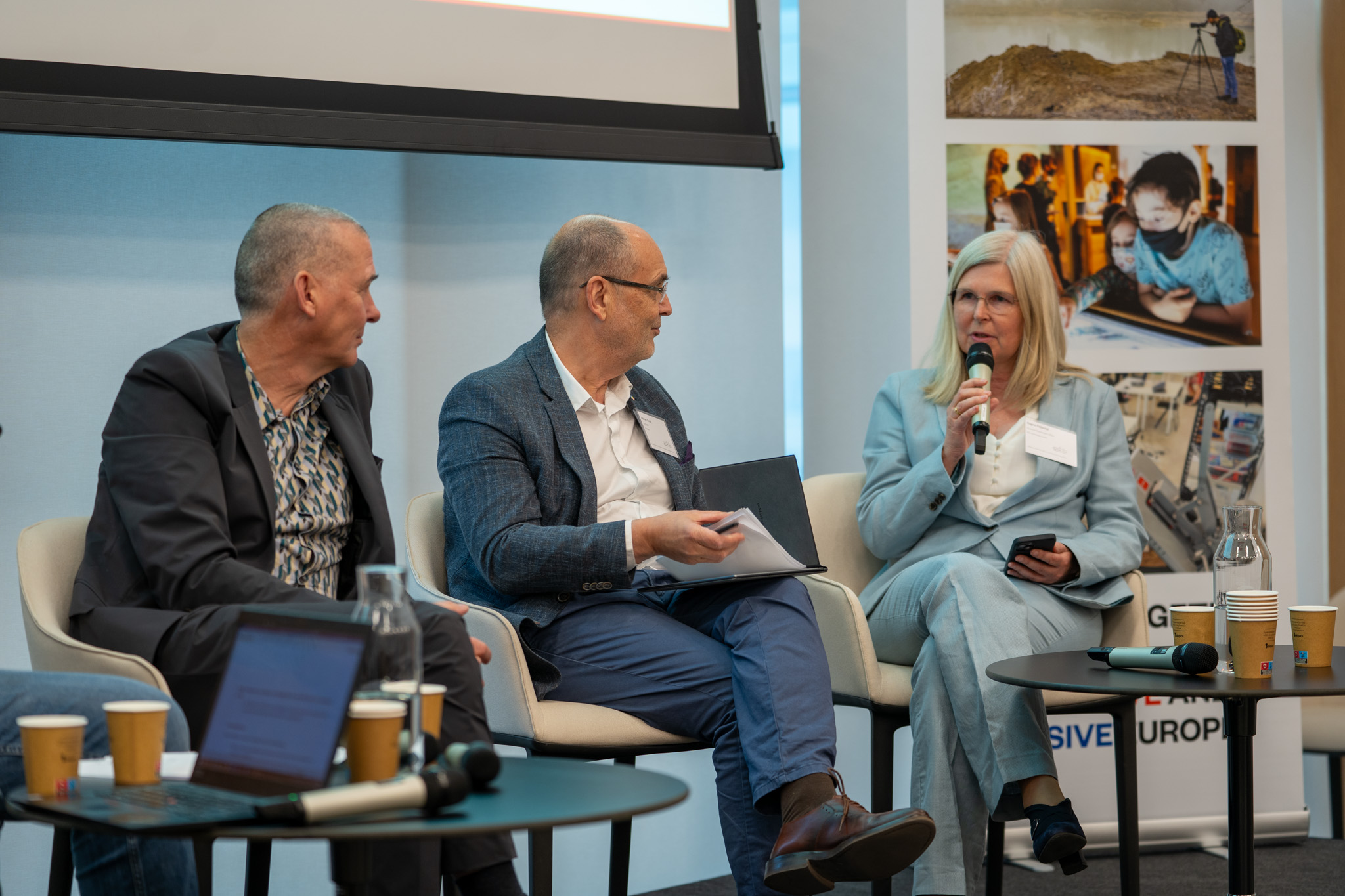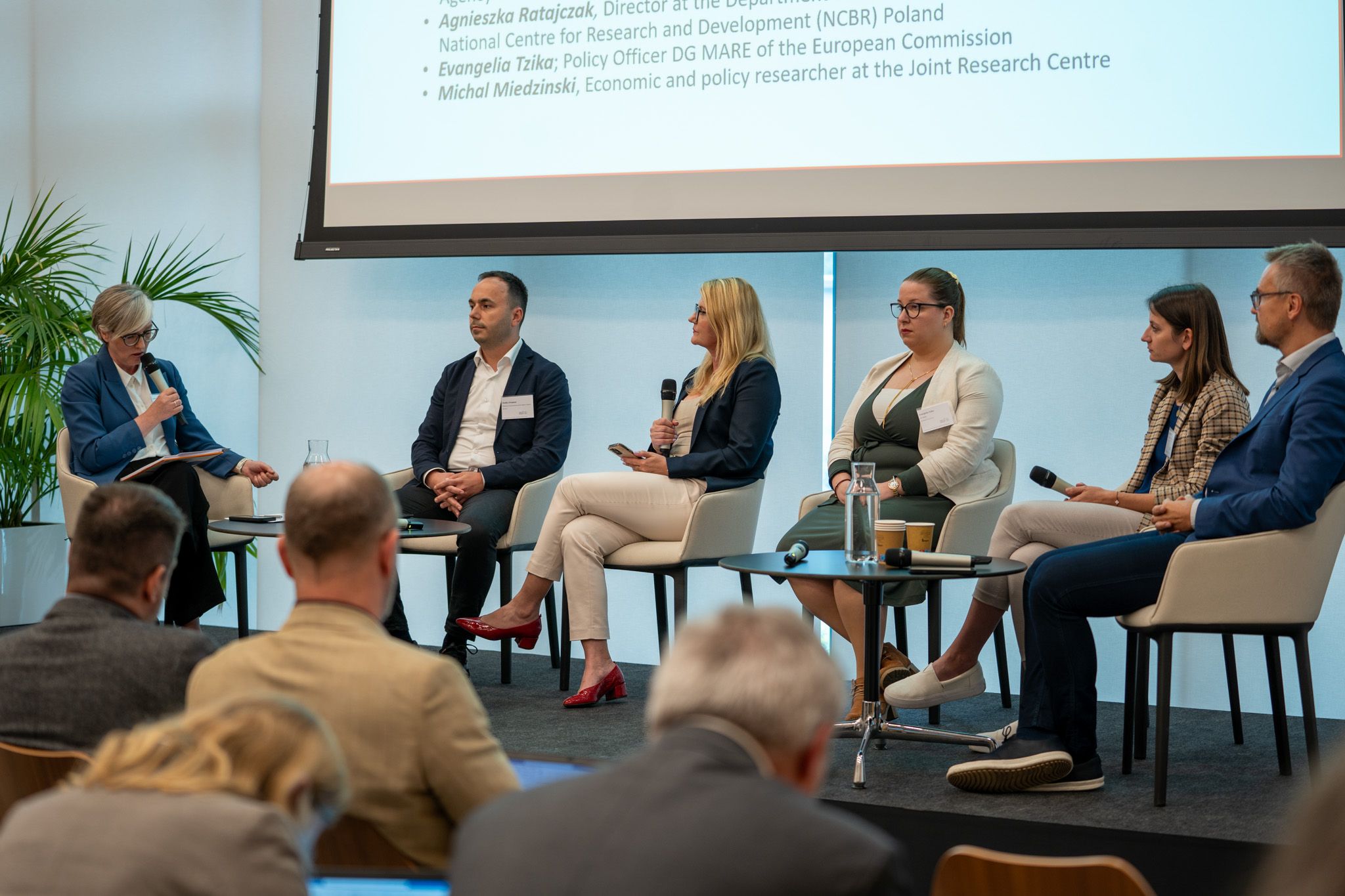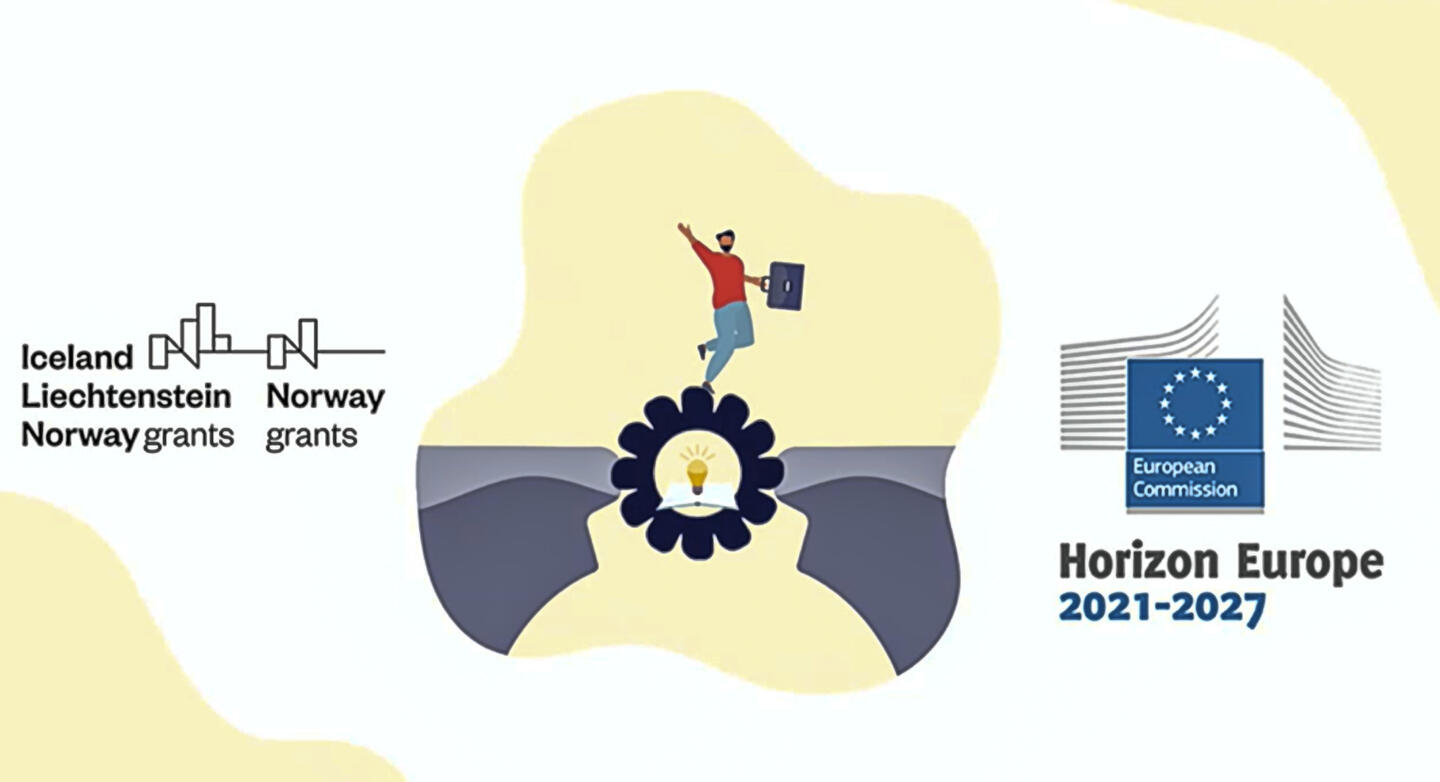The EU Missions were proposed in 2018 as strategic initiatives under Horizon Europe designed to address some of the most pressing challenges facing society today. The missions represent a concerted effort to drive transformative change, ensuring a sustainable and prosperous future for all European citizens.
“Greater potential for synergies”
The impact of the EEA and Norway Grants on the EU Missions was highlighted at the event ‘Widening the Reach of EU Missions Through EEA and Norway Grants’ on 27-28 May at the EFTA House. More than 100 stakeholders including experts working within the EU Institutions, as well as Programme Operators involved in the Grants, took part.
“The missions are excellent instruments to provide strategic framework because they have a political drive. But down in implementation there is a need for agility – and perhaps, that is where the EEA and Norway Grants could bring sense to the Missions on the ground”, said Michal Miedzinski, Economic and policy researcher at the Joint Research Centre of the European Commission.
The EEA and Norway Grants play a crucial role in supporting these missions by funding programmes and projects that promote a greener, more democratic and inclusive Europe.
“The Grants have interacted with EU schemes for over a decade, with synergies happening in the projects in the level of research groups engaging with other stakeholders. Yet, the EEA and Norway Grants interaction with EU funding schemes remains fairly limited. There is greater potential for synergies between them”, said Rune Vistad, Director of Department for International Cooperation, Research Council of Norway.
Our goal is to ensure that the investments we make today in widening countries foster resilience and innovation for the future. Ragna Fidjestøl, Managing Director at the EEA and Norway Grants
Each of the EU mission targets a specific area with ambitious goals to drive transformative change. These missions include:

Adapting to climate change
Climate change poses significant risks to Europe, impacting everything from weather patterns to agricultural productivity. The EU Adaptation to Climate Change Mission aims to enhance resilience and adaptive capacity to climate impacts, focusing on protecting people, ecosystems, and economies. This mission addresses the urgent need for strategies and measures to cope with extreme weather events, rising sea levels, and other challenges related to global climate change. The EEA and Norway Grants contribute significantly to this mission by supporting a range of activities that promote climate change adaptation and mitigation. These include developing national, regional, and local strategies and plans, such as green-blue infrastructure to reduce flooding, drought, and heat islands. The Grants expand knowledge on research and climate change, and they also enhance preparedness and risk management for extreme weather through improved national warning systems. Additionally, they strengthen competence regarding climate change impacts through training, awareness-raising, and development of new technologies and nature-based solutions.
A notable example is the ‘Wetlands for Life and Well-being’ project in Slovakia, which seeks to reverse the decline of wetland ecosystems in the Malé Leváre area. This project, funded by the Norway Grants and executed through the collaborative efforts of local Slovak experts and the Norwegian Institute for Nature Research (NINA), focuses on converting approximately 210,000 m² of degraded wetland and alluvial sites into flourishing, species-rich alluvial meadows. This restoration effort is crucial for biodiversity and natural services like flood mitigation.
By fostering collaboration, innovation, and the sharing of expertise, the EEA and Norway Grants play a crucial role in achieving the EU Adaptation to Climate Change Mission’s objectives. Their efforts ensure that even smaller, often overlooked communities can develop robust adaptation strategies, thereby enhancing Europe’s overall resilience to climate change.
Turning the tide against cancer
Cancer remains one of the leading causes of death in Europe, presenting a significant public health challenge. The EU Cancer Mission aims to improve cancer prevention, diagnostics, and treatment, striving to save more lives and enhance the quality of life for patients and survivors. This mission addresses the high incidence and mortality rates associated with cancer by fostering innovative research and clinical practices.
In cancer, it is difficult to fill the gap between what we want to do at European level and what we need to do at local level. I really see a lot of possible interactions between the EU Cancer Mission and the EEA and Norway Grants in this regard. Jan Van De Loo, Senior Expert at Unit ‘Combatting Diseases’ at DG Research and Innovation, European Commission.
The EEA and Norway Grants have been pivotal in supporting this mission. They back various initiatives across Europe, focusing on prevention, early detection, and improved treatment. These projects range from providing state-of-the-art equipment and treatment in marginalised communities to offering psychosocial support for cancer patients. The Grants enable essential collaboration, innovation, and capacity-building efforts that drive progress in cancer research and treatment. For instance, partnerships like the one between Oslo University Hospital in Norway and the Oncology Institute "Ion Chiricuță" in Romania have led to advancements in early detection techniques. The Grants also promote HPV vaccinations and improve health literacy to encourage healthier lifestyles as part of a broader cancer prevention strategy.
Through these targeted interventions and collaborations, the EEA and Norway Grants enhance the effectiveness and reach of cancer prevention and treatment across Europe, ultimately improving patient outcomes and quality of life.
Restoring our oceans and waters
Europe’s oceans and waters face unprecedented risks, from plastic pollution to ecosystem degradation. The EU Ocean Mission aims to protect and restore the health of these vital resources by 2030 through research, innovation, citizen engagement, and blue investments. The mission addresses critical challenges such as pollution, overfishing, and biodiversity loss.

Ragna Fidjestøl, Managing Director at the Financial Mechanism Office at the EU Ocean Days in Brussels in March 2024.
The EEA and Norway Grants contribute significantly to this mission by supporting various projects that promote ocean health and sustainable practices. The Grants fund basic and applied research on ocean health, innovation for environmentally sustainable solutions, and efforts to boost sustainable blue growth.
I would like to thank enormously the EEA and Norway Grants for the work they are doing for the Mission. We're in the same boat. We want to move together, with the same objectives of cleaning and restoring our ocean and waters. Charlina Vitcheva, Director General from Directorate-General for Maritime Affairs and Fisheries
For instance, the Pharmarine project unites Norwegian and Polish researchers to study pharmaceutical residues in the Arctic waters and their impact on marine life. In cooperation with SINTEF Ocean in Norway, this project exemplifies the type of collaborative efforts supported by the Grants. unites Norwegian and Polish researchers to study pharmaceutical residues in the Arctic waters and their impact on marine life. In cooperation with SINTEF Ocean in Norway, this project exemplifies the type of collaborative efforts supported by the Grants.
Additionally, the Grants support the development of biodegradable fishing gear, efforts to reduce marine litter and pollution, and education and training programs on ocean literacy. They also engage environmental NGOs and foster civic engagement to protect marine environments. By fostering such partnerships and supporting diverse initiatives, the EEA and Norway Grants play a crucial role in achieving the EU Ocean Mission’s goals, ensuring a sustainable future for Europe’s oceans and waters.
Building climate-neutral and smart cities
Urban areas are at the forefront of environmental and social challenges, including high carbon emissions, air pollution, and resource inefficiency. The EU Mission Climate-Neutral and Smart Cities aims to support 100 European cities in their transition towards climate neutrality by 2030. This mission focuses on integrating sustainable urban planning, innovative technologies, and citizen engagement to create smarter and more sustainable cities.
The EEA and Norway Grants play a pivotal role in supporting this mission by funding projects that enhance sustainable and resilient urban environments. The Grants support initiatives such as basic and applied research for climate resilience, energy efficiency enhancements, renewable energy adoption, and smart urban planning. An important focus is on capacity-building for local authorities, urban planners, and relevant stakeholders, particularly in smaller municipalities not eligible for EU funds.
A notable example is the "USAGE-Urban Stormwater Aquaponics Garden Environment" project, a collaboration between Wrocław and Oslo. This project has developed green-garden installations for food production using aquaponic systems supported by rain and stormwater collection infrastructure. Besides food production, it plays an educational and social role, integrating citizens, creating workplaces, and promoting environmentally friendly behaviours.
“I am impressed by the level of readiness of the Norwegian cities. The EEA countries such as Norway have a pool of cities that have developed experience and knowledge on reaching climate neutrality very soon. This is experience that can be shared with many countries in Europe and the EEA and Norway Grants can provide the opportunity for exchange of good practices”, said Philippe Froissard, Head of Unit, Strategy, Policy Coordination and Urban Transitions, DG Research and Innovation, European Commission.
The Grants also support innovative and sustainable technological solutions for urban areas, such as green and blue infrastructure projects that create greener spaces and improve water management. They assist in the development and implementation of policies and strategies at local and regional levels and engage environmental NGOs and civic groups in promoting climate-neutral cities.
The Grants can be used as an equalizer, particularly in those countries that don’t have the same level of ambition when it comes to digital and green transitions. Philippe Froissard, Head of Unit, DG Research and Innovation, European Commission
By promoting smart and sustainable urban development, the EEA and Norway Grants help cities across Europe to become more liveable, efficient, and environmentally friendly.
Promoting healthy soils
Healthy soils are fundamental to sustainable agriculture, climate resilience, and ecosystem health. The EU Mission "A Soil Deal for Europe" aims to ensure sustainable soil management, combat soil degradation, and restore soil health. This mission addresses critical issues like soil erosion, forest degradation, and the need for resilient agricultural practices.
The EEA and Norway Grants contribute significantly to this mission by supporting various initiatives aimed at improving soil health and promoting sustainable land management. These Grants fund research and projects that implement resilient agricultural practices, empower local communities in forest management, and foster dialogue among stakeholders to improve working conditions in the agriculture sector. For example, the ALGACYCLE project in Portugal addresses the environmental impact of soilless crop production by reusing drain water to cultivate microalgae, which can be used as bio stimulants for plants or feeds for aquaculture. This innovative solution highlights how the Grants support sustainable food systems and high-quality environmental production.
Additionally, the Grants support awareness-raising activities to improve soil health and sustainable land management. Through these efforts, the EEA and Norway Grants play an essential role in promoting sustainable agricultural practices and protecting soil health across Europe.
Widening the reach of the EU Missions through the Grants
The collaboration between the EU Missions and the EEA and Norway Grants is instrumental in addressing Europe's most pressing challenges. From adapting to climate change and combating cancer to restoring oceans, promoting smart cities, and ensuring healthy soils, these initiatives drive transformative change across the continent.
The continued partnership between the Grants and the EU Missions is vital for sustaining and enhancing these efforts, ensuring a resilient, sustainable, and prosperous future for all European citizens. By working together towards common goals, they can foster innovation, strengthen capacities, and build a stronger, more united Europe.

Conference 'Widening the rearch of EU Missions through the EEA and Norway Grants' at the EFTA House (Brussels) on 27 - 28 May. Photo credits: Preben Andre Andersen.
One of the main challenges the EU Missions have is to identify additional sources of funding. With Horizon Europe alone you can’t make the Missions a success. Marnix Surgeon, Deputy Head of Unit at DG Research and Innovation, European Commission.
The EFTA House event in May to highlight the synergies and complementarities between the EU Missions and the EEA and Norway Grants was organised by the Research Council of Norway and the EEA and Norway Grants Secretariat, with participation and contributions of EEA and Norway Grants' Programme Operators (The Czech Technology Agency of the (TACR), the Polish National Centre of Research and Development (NCBR), the Romanian Executive Agency for Higher Education, Research, Development and Innovation Funding (UEFISCDI) and the Portuguese Directorate General for Maritime Policy (DGPM) as well as Donor Programme Partners Rannis and Innovation Norway.
The event aimed to showcase the synergies between the Grants and the EU Missions. There were plenary sessions, panel discussions, and workshops focused on aligning Grant-funded projects with mission objectives, ensuring a united approach to tackling Europe’s most pressing challenges.

Conference 'Widening the rearch of EU Missions through the EEA and Norway Grants' at the EFTA House (Brussels) on 27 - 28 May. Photo credits: Preben Andre Andersen.
By bringing together key stakeholders, the event aimed to further solidify the crucial role of the EEA and Norway Grants in achieving the transformative goals set by the EU Missions, fostering a more resilient and sustainable future for all.
Find out more about the event here.
